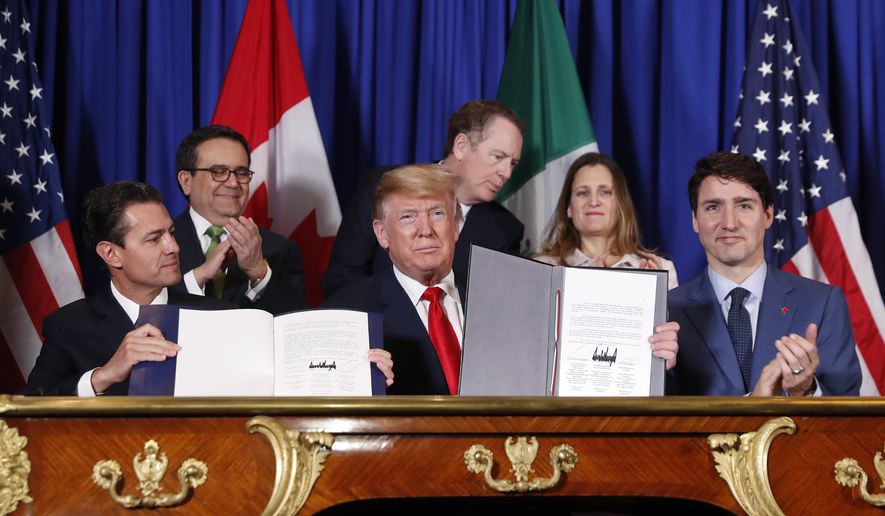President Trump on Friday joined leaders of Mexico and Canada in signing a new three-way trade pact to replace NAFTA, scoring a big win at the opening of the Group of 20 summit in Argentina.
Mr. Trump called the massive trade deal dubbed the U.S.-Mexico-Canada Agreement, or USMCA, a “model agreement that changes the trade landscape forever.”
The agreement sets new rules on agriculture, technology and auto imports, protects autoworkers’ jobs in the U.S. and opens Canada to American dairy products.
But the agreement still needs approval by Congress and could run into trouble, including careful scrutiny by the new Democrat majority in the House.
Replacing NAFTA fulfills a top campaign promise by Mr. Trump, who called the 1994 agreement the “worst deal ever made” that hastened the demise of U.S. manufacturing.
“The USMCA is the largest, most significant modern and balanced trade agreement in history. All of our countries will benefit greatly. It is probably the largest trade deal ever made,” Mr. Trump said at the start of the signing ceremony.
The three leaders are in Buenos Aires for the G-20 summit that opened Friday.
Trade will dominate Mr. Trump’s conversations at the meeting of the world’s leaders, including a high-stakes dinner Saturday with Chinese President Xi Jinping. They will try to begin resolving the trade war between their two countries.
Also inking the USMCA were Canadian Prime Minister Justin Trudeau and Mexican President Enrique Peña Nieto, who signed it on his last day in office.
The three-way negotiations were on a tight timetable to finish before Mr. Peña Nieto leaves office. Although Mexican President-elect Andrés Manuel López Obrador was included in the talks, there was a chance he would want to put his own stamp on the deal.
Mr. Trudeau, whose government was the longest holdout in negotiations, wasn’t entirely enthusiastic about the deal. He used the occasion to urge Mr. Trump to end other get-tough trade policies that are hitting Canada.
“Donald, it’s all the more reason why we need to keep working to remove the tariffs on steel and aluminum between our countries,” Mr. Trudeau said.
U.S. Trade Representative Robert Lighthizer told reporters after the signing ceremony, “The steel and aluminum tariffs do continue. … We want an agreement that’s fair to Mexico and fair to Canada but maintains the integrity of the president’s steel and aluminum programs.”
House Democrats signaled their intent to shape the final deal.
“While Trump likes to claim victory and make a ceremonial show, today’s signing is merely the next step in an incomplete and ongoing process. There is still a ways to go to gain support in the new Congress for this agreement,” said Rep. Bill Pascrell Jr., the top Democrat on a House trade subcommittee.
• Dave Boyer can be reached at dboyer@washingtontimes.com.
• S.A. Miller can be reached at smiller@washingtontimes.com.




Please read our comment policy before commenting.